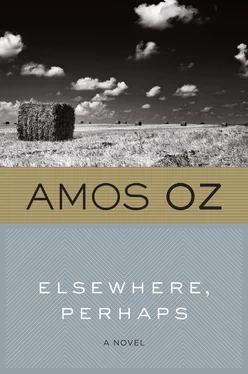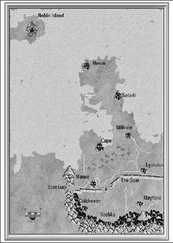Three days before the festival, the kibbutz assembled to elect its new committees. In a number of cases we could not avoid bringing public pressure to bear on those who refused to accept the burden of office. The community can neither exercise brute force nor hold out promises of material gain. Our system compels us to rely entirely on moral sanctions. The formation of the new committees was completed in the course of two general assemblies. The members of the various committees can expect to receive no material advantages. On the contrary, they have to shoulder an additional burden of difficulties and frustrations. Despite this, suitable candidates were found and consented to stand.
Herbert Segal was elected secretary of the kibbutz. That is not to say that we had anything against Tsvi Ramigolski, who had fulfilled his duties to the very best of his ability. Nevertheless, we were pleased at Herbert's election. People are not made identically, like coins coming from the mint. On the basis of long acquaintance with both of them we are convinced that the best of Herbert Segal's ability is better than the best of Tsvi Ramigolski's. Tsvi, incidentally, did not escape the burden of active responsibility: he was to succeed Podolski as co-ordinator of the work rota, so that Podolski could take over from Yitzhak Friedrich the office of treasurer. Mundek Zohar, naturally, continued to serve as chairman of the regional council. The vacant chair of the education committee, which had recently lost two of its leading members, Herbert Segal, the new secretary of the kibbutz, and the late Fruma Rominov, was left unfilled until after the festival. Many members supported the candidature of Bronka Berger. We, for reasons best known to ourselves, preferred Yitzhak Friedrich, the ex-treasurer.
A decision would also have to be taken about the case of Grisha Isarov. It had been suggested to Grisha that he spend two years away from his family helping an emerging African country to build up its armed forces. Grisha had difficulty in concealing his enthusiasm and excitement. Some of his opponents said that he was incapable of staying in the same place for five consecutive years. If we let him, he would spread his wings and flit from one adventure to another. Others objected to the proposal on the grounds that there was no one to replace him in his work at the Fish ponds. Our own objection was founded on different considerations. Esther Klieger's life would be hell if she were left to bring up seven unruly children on her own. And a man ought to accept responsibility for his family.
The day before the festival, Rami Rominov came home on leave. The arduous training had left his face lean and weatherbeaten. His resemblance to a certain quadruped had become so marked that it was no longer amusing.
Out of his meager earnings as a soldier Rami had bought Herbert Segal a book titled Israeli Society and the Challenge of Our Times, and for Noga he had bought a small box of water colors.
Rami left his bags in Herbert's room and went to the dining hall. He made a detour to avoid passing his mother's room. That same morning a young couple had moved in. Rami did not want to see the changes; he was afraid of the sadness. But the sadness crept in in a different way. The women who were serving lunch showered special tidbits on him. They were trying to make him happy. They failed, because he saw through their motives and only felt more miserable.
Toward evening, just before the festive meal, Rami and Noga went for a short walk together. Noga said to Rami that he looked nicer out of uniform. Rami agreed. They did not talk about army life. She did not ask, and he was not eager to tell. The conversation turned on a different topic: whether people's characters could be changed. Rami did not deny the effects of heredity, but he believed in the power of education, and even more so in the power of personal determination. Noga thought that the poet whose name she had forgotten was right when he had said that man was merely a reflection of the landscape of his birthplace. She interpreted the phrase "landscape of his birthplace" broadly, to mean inherited characteristics. "Birthplace" is something in our blood, not just a geographical location.
Rami was inclined to disagree but changed his mind and said to Noga that she was not an ordinary sort of girl. Noga smiled at him gratefully. Her smile made him shiver, and this Noga noticed. A feeling of pride ran through her. She leaned toward him and kissed him as if he were her brother Gai. Rami went pale. He reached out and squeezed her shoulder roughly, studiedly, as if he had been rehearsing the gesture in his mind. Suddenly he asked her hoarsely if she would be his wife. Noga smoothed her skirt. Both their gazes fixed on the same spot. Noga was the first to raise her eyes.
"Why?" she asked.
Rami's lips curled and he muttered:
"What do you mean 'Why?' I… That's not an answer. I'm asking you a serious question."
"You shouldn't have asked."
"Yes I should. I had to."
Noga said:
"You're sweet, Avraham Rominov."
And in her voice there sounded that long-forgotten tone in which as a child she had always addressed people much older than herself.
The dining hall is brightly lit. There are white cloths on the tables, and brightly colored plastic dishes. A large banner with the cheerful message: RING OUT THE OLD, RING IN THE NEW! The portrait of Aaron Ramigolski may God avenge his soul, looks down on us: a young man with an unruly mop of hair, an open-necked shirt and an attempt at a mustache. His features resemble those of his brother Tsvi, though they are somewhat softer. Aaron's face is Tsvi's face without the harsh imprint of the years. What is he thinking as he looks down at us? We teach our children to try to live up to his memory. We tell ourselves the same thing. We look at him. He looks back at us without a trace of rancor. The company bursts into song. Latecomers walk on tiptoe. Nobody looks askance at them. Their neighbors wish them a Happy New Year, and they reply, a happy and prosperous New Year to you. A sharp ear can isolate some familiar voices: Grisha's pass rumble, Einav's soprano, and our guest Siegfried rushing shamelessly ahead of the rest. To all outward appearances, Siegfried has become one of us. He has abandoned his jacket and tie and now sits wearing a white shirt with the sleeves rolled up above his elbows. You can tell he is happy, because he is beating time on the table with his cup. The singing is followed, as is our custom, by a sequence of readings. Some of them are taken from traditional texts and some from our newborn folklore. Herbert Segal, the new secretary of the kibbutz, reads: "Send us dew and rain in their due season." Ezra leans toward his brother and whispers:
"Our ancestors were clever peasants. Did you notice: they didn't pray for a certain quantity of rain. They asked to have it in its due season. At the right time. And that's the really important thing."
Zechariah smiles delightedly at this exciting piece of exegesis and says:
"Yes, yes, that's right."
Now, according to custom, the heads of the various farming activities rise in turn to give an account of the achievements of the past year.
Dafna Isarov gives a spirited reading of the poem "In the Fields," by our national poet Bialik. Rami casts a sidelong glance at the Harish family. Noga is sitting between her father and her brother. Herbert Segal, Rami's neighbor, intercepts his glance and makes room for it in his tight-lipped ruminations. Perhaps another eye is watching Herbert watching Rami. But no. It seems certain that the adversary has temporarily abandoned his barricades and is wholeheartedly enjoying the celebrations.
Grisha thunders (from notes):
"Let us drink to the new year. Let us drink to working men and women wherever they may be. Let us drink to a year of plenty, a year of joy and peace. Lehayim, comrades. A Happy New Year!"
Читать дальше












